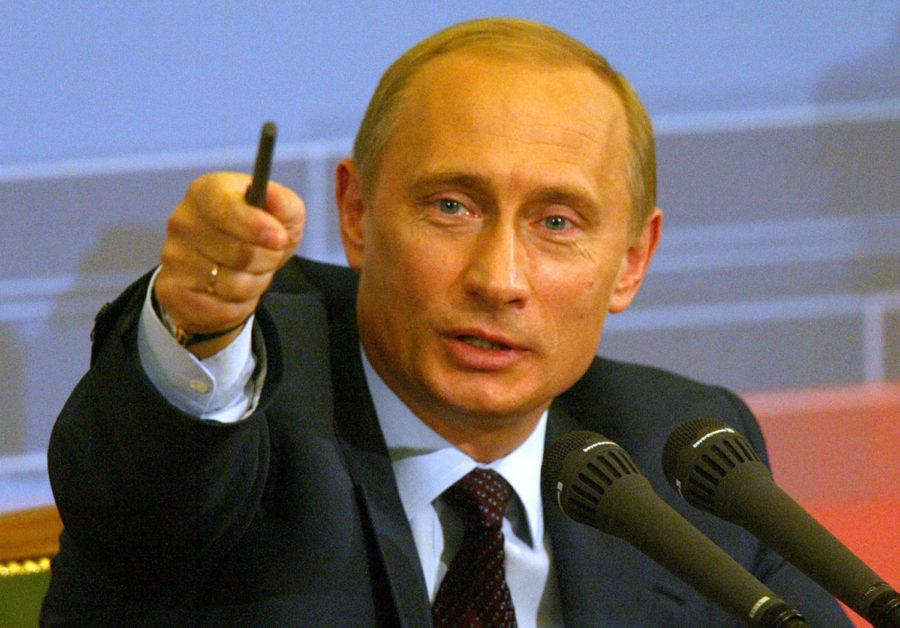Glawe: The New Russia? Hardly
Russian President Vladimir Putin recently submitted an op-ed to The New York Times that pleading caution with U.S. intervention in Syria. Columnist Michael Glawe sees hidden motives within Putin’s piece as Russia hopes to protect its interests in Syria.
September 15, 2013
Former KGB operative and current Russian President Vladimir Putin recently submitted a disappointing and somewhat misleading op-ed to The New York Times regarding a Syrian intervention. It was contextualized as a “plea for caution,” addressed to the American people — sidestepping our representatives in an attempt to cull the hearts of uneasy citizens.
Never mind Putin’s ingratiating tone; the content is equally indicative of a huckster, rather than the leader of a world power. As he put it: “Millions around the world increasingly see America not as a model of democracy but as relying solely on brute force.” Yes, well, we’ll be the judges of that. The memory of that once tyrannical regime of the Baltic seems to have surreptitiously escaped from the mind of Putin.
Nonetheless, many in the United States have bought into these remarks. Not surprisingly, as the minority of Americans who do favor intervention in Syria have had to suffer a great deal of slander already, why not add to it? The empty titles have run their course — “warmonger,” “imperialist” and the like. It is unfortunate to see my fellow citizens praise Putin as a legitimate peacekeeper. Has our credulity forgotten the woes of Chechnya?
It is not bravado that enables our defiance of an old rival, but a dedication to the facts and an application to the cause. There is a salient objective to Russia’s motives that stoops below the honorable and respectable role of peacekeeper.
It has been exhaustively reported Russia has much at stake in Syria. As American historian Amy Knight has detailed, Russia and Syria have strong trade and military ties. In 2011 alone, Russia exported approximately $1 billion worth of arms to Syria. In addition, “Russia also has a naval base in Syria, Tartus, which gives it a crucial strategic presence in the Mediterranean Sea.”
Peculiarly, Putin claims: “We are not protecting the Syrian government, but international law.” Doling out S300 anti-aircraft missiles and MiG fighter planes to the Syrian government certainly suggests the contrary.
James Nixey, head of the Russia and Eurasia Program at the London-based Chatham House think tank, provided an interesting remark: “Russia is so desperate for influence it takes anything it can — it is not that it adores Assad by any means.” Perhaps there is some truth to this, but I think we can dig deeper.
The discovery of an op-ed written by then Prime Minister Putin, dated Nov. 14, 1999, uncovers interesting and obvious contrasts to his most recent op-ed. In his 1999 writing, Putin again fabricates ridiculous analogies to justify Russian military strikes against Chechnya. His previous support of American military strikes against terrorist facilities in Sudan and Afghanistan is telling.
If we can take anything away from a comparison of the two op-eds, it is that Russia has as much experience dealing with terrorists as the United States does. The Russian apartment bombings (it is claimed that they were carried out by Chechen rebels), ignited Russia’s fight against Islamic fundamentalism as effectively as the attacks on the World Trade Center incited the invasion of Iraq and Afghanistan.
Perhaps we now have the insight needed to understand Putin’s disposition against the rebel forces. Like Assad’s regime, the post-Soviet Union of the 1990s made it a priority to stamp out the Chechen rebellion. In regards to the use of chemical weapons, Putin contends: “There is every reason to believe it was used not by the Syrian Army, but by opposition forces, to provoke intervention by their powerful foreign patrons, who would be siding with the fundamentalists.” Evidence strongly suggests otherwise, though.
I am sure I speak on behalf of a majority of my peers when I say that a terrorist takeover of the opposition would be a horrible idea. It is also true that those supporting the opposition do not quickly ally themselves with the terrorist forces seeking to take power after Assad’s fall. We support the moderates who wish to overthrow an oppressive regime which has engaged in a mass slaughter of its civilians for years. Without our support, the moderates are forced to ally with the terrorists.
Though Syria’s chemical armament is in the process of being curtailed by diplomatic means, which I will give full credit to Russia as due, we cannot forget what Putin’s government stands for. We must see through Putin’s pseudo-friendliness.
As he concluded in his op-ed: “There are big countries and small countries, rich and poor, those with long democratic traditions and those still finding their way to democracy”. Yes, and your country is, unfortunately, still searching.







